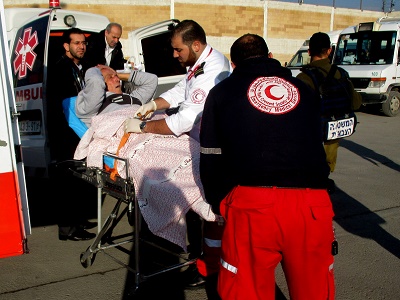
By Tamar Fleishman – Qalandiya
The ambulance was detained for about six hours and in it was a resident of Gaza, who had been discharged from a hospital in Nablus after over going heart surgery.
For six hours the ambulance had waited on the Palestinian side of the checkpoint for someone to solve the bureaucratic mess. But apparently no one thought it to be an urgent matter. No one on the other side of the rifle or of the computer or of the phone thought that letting a person suffer like that for six hours was terrible.
There are regulations and there are rules and there are orders that are given by someone and preformed by someone else, but the person on the other side, the one on the gurney, doesn’t count.
“No co-ordinations have been made” they told the ambulance driver, which in Israeli army code means that the GSS won’t authorize the patient to cross the checkpoint and head home.
How could it be that someone who had been thoroughly inspected not so long ago and received permission from the very same authority to leave the Gaza strip, had crossed Erez checkpoint, got on an Israeli ambulance, drove to Qalandiya checkpoint and from there continued to a hospital in Nablus for life saving heart surgery, and now when heading back and lingering between life and death, unable to move without help, escorted by a doctor that was sent on behalf of the hospital to keep him alive, has in a blink of an eye turned into a security threat to Israel?
He posed such a serious threat that it was necessary to prevent him from crossing the checkpoint and heading home. This can only be answered by stating that anything is possible in the interaction between the occupier and the people under his rule.
Once the matter was resolved and it turned out that there is no prevention on the passage of this patient, and he and the relative that escorted him were allowed to cross the checkpoint, they had to say their goodbyes to the doctor, as there was a prevention on his passage and he couldn’t continue taking care of the patient during his ride to the Gaza strip.
Perhaps it was because he didn’t have a clearance, perhaps he was too young, perhaps someone in his family was incarcerated or a suspect or about to face a trial.
After all, they, the Palestinians, have a profile and everything is determined according to that profile.
The patient switched four gurneys that day, three ambulances and crossed two checkpoints.
There are many excuses for such conduct and many explanations and they are always “by the book”.
And even if this person hadn’t survived the abuse he went through during the hours of detainment at the checkpoint, no one would have been held accountable just as no one would have been held accountable if he hadn’t survived the trip from Qalandiya to Erez checkpoint.
Truth be told, such a reality is possible only because those who run the bureaucratic system don’t perceive the Others as human beings, but as a files filled with data according to which they with must be dealt with and which predetermine their fate.
(Translated by Ruth Fleishman.)
– As a member of Machsomwatch, once a week Tamar Fleishman heads out to document the checkpoints between Jerusalem and Ramallah. This documentation (reports, photos and videos) can be found on the organization’s site: www.machsomwatch.org. The majority of the Spotlights (an opinion page) that are published on the site had been written by her. She is also a member of the Coalition of Women for Peace and volunteer in Breaking the Silence. She contributed this article to PalestineChronicle.com.




